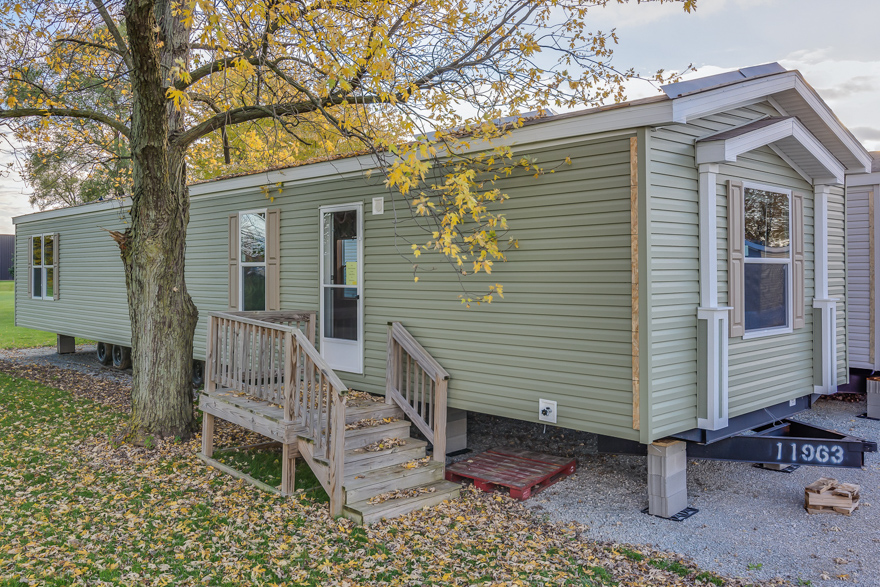The landscape of housing has evolved significantly over the years, offering a diverse range of options to cater to various preferences and lifestyles. Among these alternatives, mobile homes have gained popularity for their affordability and flexibility. One common question that often arises is whether single-wide mobile homes are genuinely portable. In this article, we will delve into the characteristics, misconceptions, and realities surrounding single-wide mobile homes to answer the question: Are single-wide mobile homes considered portable homes?

Understanding Single-Wide Mobile Homes
Single-wide mobile homes, also known as manufactured homes, are factory-built structures designed for residential living. They come in various sizes, with single-wide being one of the configurations. The term “single-wide” refers to the width of the home, typically 18 feet or less. These homes are constructed in a controlled environment, meeting strict federal building codes to ensure safety and quality.
Portability: Breaking Down the Misconceptions
The term “mobile home” might evoke images of a dwelling on wheels, ready to be hitched to a vehicle and moved at a moment’s notice. However, the reality is a bit more nuanced. Single-wide mobile homes are indeed movable, but the process is not as simple as hooking them up to a truck and driving away.
1. Wheels and Axles: A Thing of the Past
In the past, mobile homes were equipped with wheels and axles, allowing for relatively straightforward relocation. However, modern single-wide mobile homes are typically installed on a permanent foundation. This means they are not designed for frequent moves like recreational vehicles or traditional trailers. While it is technically possible to move a single-wide mobile home, the process involves hiring professionals, obtaining permits, and complying with local regulations.
2. Transportation Challenges
Unlike recreational vehicles or tiny houses on wheels, moving a single-wide mobile home requires specialized equipment such as a flatbed truck or hydraulic trailer. Additionally, the home must be disassembled to some extent, with the roof, siding, and other components often removed for transportation. This process makes moving a single-wide mobile home more complex and expensive than towing a travel trailer.
3. Zoning and Permitting
Local zoning laws and regulations play a crucial role in determining whether a single-wide mobile home can be relocated. Many areas have stringent guidelines governing the movement and placement of manufactured homes. Obtaining the necessary permits and approvals can be a time-consuming and bureaucratic process.
Advantages of Single-Wide Mobile Homes
While the portability of single-wide mobile homes may be limited compared to conventional perceptions, these homes offer several advantages that make them an attractive housing option:
- Affordability:
Single-wide mobile homes are often more affordable than traditional stick-built houses. This makes homeownership more accessible to a broader range of individuals and families. - Quick Construction:
Manufactured homes, including single-wide configurations, can be produced and assembled more quickly than traditional homes. This allows for a faster move-in process, saving both time and money. - Customization Options:
Many manufacturers offer a variety of customization options, allowing homeowners to personalize their living spaces. From floor plans to finishes, there is flexibility in tailoring the home to individual preferences. - Energy Efficiency:
Modern single-wide mobile homes are designed with energy efficiency in mind. They often include features such as insulation, energy-efficient windows, and energy-efficient appliances, contributing to reduced utility costs.
Conclusion: A Fixed Home with Flexibility
While the term “mobile home” may suggest a high level of mobility, the reality of single-wide mobile homes is more nuanced. These homes offer a fixed and affordable housing solution with a degree of flexibility in terms of relocation. Understanding the limitations and advantages of single-wide mobile homes is crucial for those considering this housing option.
For those seeking a cost-effective and customizable dwelling that provides a sense of homeownership without the permanence of traditional houses, a single-wide mobile home can be an excellent choice. It’s essential to approach the decision with a clear understanding of the local regulations, the logistics involved in moving the home, and the long-term commitment that comes with this housing option. As the housing landscape continues to evolve, single-wide mobile homes stand as a viable and attractive choice for those in search of a home that balances affordability and flexibility


Looking for a 2 bedrooms and 2 bathroom
Thanks for the comment Edith, we hope you are well. Feel free to reach out to us via email directly to get information on how we can help: mark@sellmobilehome.com thank you.